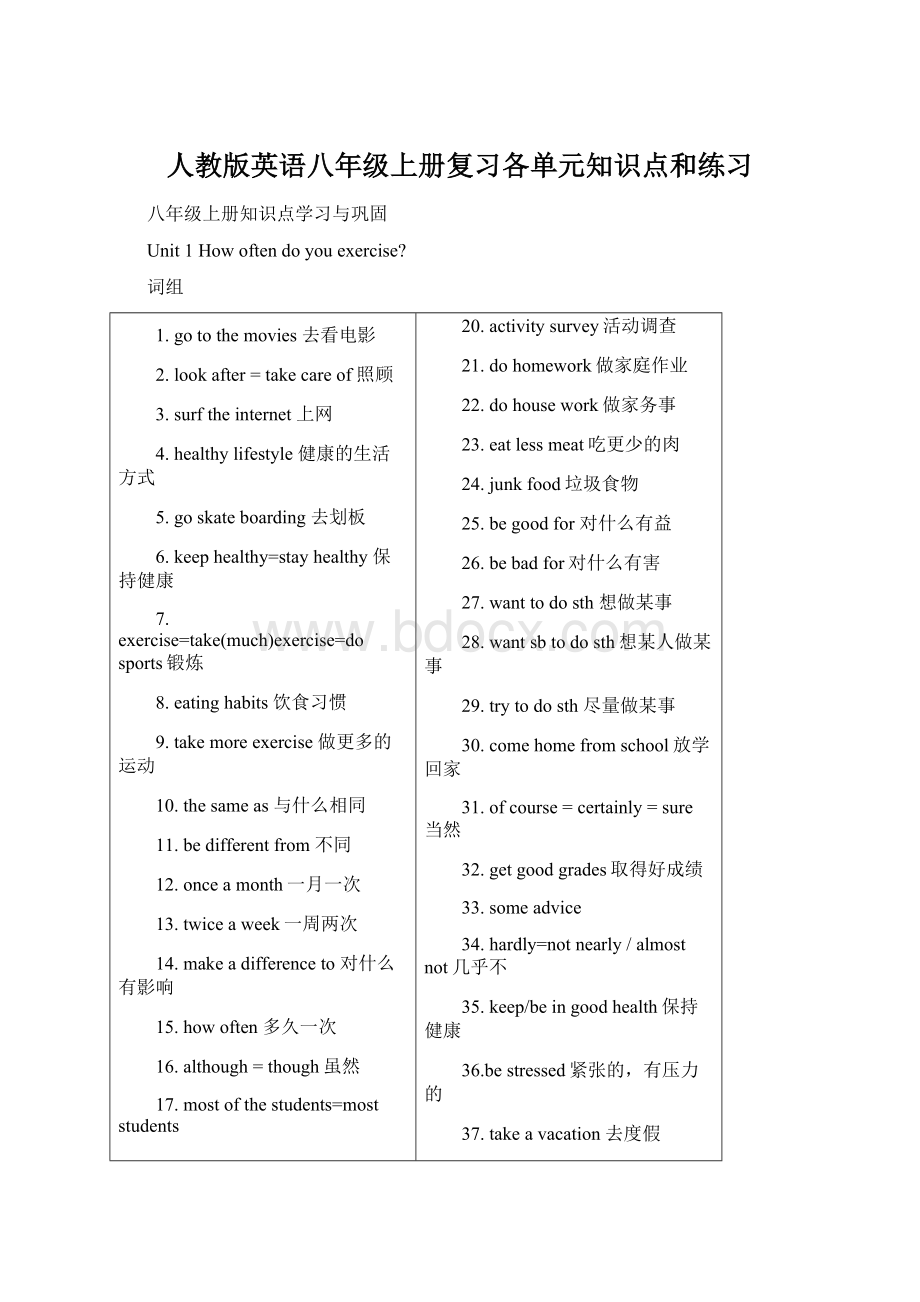 人教版英语八年级上册复习各单元知识点和练习Word文档下载推荐.docx
人教版英语八年级上册复习各单元知识点和练习Word文档下载推荐.docx
- 文档编号:16625821
- 上传时间:2022-11-24
- 格式:DOCX
- 页数:71
- 大小:80.39KB
人教版英语八年级上册复习各单元知识点和练习Word文档下载推荐.docx
《人教版英语八年级上册复习各单元知识点和练习Word文档下载推荐.docx》由会员分享,可在线阅读,更多相关《人教版英语八年级上册复习各单元知识点和练习Word文档下载推荐.docx(71页珍藏版)》请在冰豆网上搜索。

28.wantsbtodosth想某人做某事
29.trytodosth尽量做某事
30.comehomefromschool放学回家
31.ofcourse=certainly=sure当然
32.getgoodgrades取得好成绩
33.someadvice
34.hardly=notnearly/almostnot几乎不
35.keep/beingoodhealth保持健康
36.bestressed紧张的,有压力的
37.takeavacation去度假
48.getback回来
SectionA
1.Howoften多久(一次)
Howoftendoyouexercise?
你多久锻炼一次身体?
Howoftendoesyourmothergoshopping?
你妈妈多久购一次物?
【区别】Howoften和Howmanytimes
①Howoften用来提问某个动作间隔多久发生一次,即询问动作发生的频率。
通常对一些表示频率的副词进行提问;
也可以对频度短语进行提问。
②Howmanytimes意思是“多少次”,是用来提问做某事的次数的,往往就once,twice,threetimes等词语进行提问。
典型例题:
1)LiMingdoeshishomeworkeveryday.(就划线部分提问)→
HowoftendoesLiMingdohishomework?
解析:
everyday属于频度短语,就频度短语提问用Howoften.
2)Theoldmanwenttothezoothreetimesthisyear.(就划线部分提问)→
Howmanytimesdidtheoldmangotothezoothisyear?
这里就次数提问用howmanytimes.
2.hardly几乎不,简直不
Therearehardlyanystudentsintheclassroom.几乎没有学生在教室里。
Thereishardlyacloudinthesky.天空中几乎没有云。
【区别】hardly与hard
①hardly不是hard加后辍所构成的,它是副词,常与can或any连用。
②hard可用作形容词,意思为“艰难的,困难的,勤奋的”可等同于“difficult”。
它也可用作副词,意思是“努力地,刻苦地,猛烈地”。
1)学好英语不难。
(翻译成英语)→
解析:
答案是It’snothardtolearnEnglish.这里hard为形容词,艰难的,困难的。
2)Wemust(努力学习).
在英语中努力学习或努力工作,我们常用workhard来表示,这里hard是副词,修饰前面的动词work.故答案为:
workhard
SectionB
知识要点
1.【区别】maybe,maybe
maybe是副词,意思是“也许,可能”,相当于perhaps,常用于句首。
如:
Maybehewillcallyoutomorrow.或许他明天给你打电话。
maybe是由情态动词may和系动词be构成,译成汉语为“可能是”,在句中作谓语。
Tommaybeathome.汤姆可能在家。
Maybe和maybe有时可以互相转换。
Maybeheisright.可等同于:
Hemayberight.
2.although的用法
although表示“虽然”,是从属连词,引导让步状语从句,语气较重,且比较正式,所引导的从句放在主句前后均可,可用though替换。
注意:
though/although不能和but同时出现在一个句子中,但可以和yet连用。
Although/Thoughitissnowing,itisnotverycold.=Itissnowing,butitisnotverycold.=Although/Thoughitissnowing,yetitisnotverycold.虽然下着雪,但并不是很冷。
随堂达标
一、单项选择
1.Mymothertoldme________youanything.
A.tellnotB.nottellC.tonottellD.nottotell
2.“I’lltrymistakesagain.”Shesaid.
A.don’tmakeB.nottomakeC.notmakeD.tonotmake
3.Wouldyouliketoeat?
A.somethinghealthyB.anythinghealthy
C.somethinghealthD.healthysomething
4.Doingmorningexercisesyourhealth.
A.isbadtoB.isgoodforC.isbadforD.isgoodto
5.heworksveryhard,hefails.
A.BecauseB.SinceC.ifD.Although
二、用单词的适当形式填空。
1.Alotofvegetableshelpyou____________(keep)ingoodhealth.
2.Mymotherwantsme____________(drink)somemilkeveryday.
3.His____________(eat)habitsareprettygood,sohe’sveryhealthy.
4.Youmusttry____________(eat)lessmeat.
5.Goodsleepcanhelpyoutostudy____________(well).
三、完成句子。
1.妈妈想让我天天喝牛奶。
Mymotherwantsme____________________________________everyday.
2.天天跑步对我们的健康有好处。
Runningeverydayis________________________ourhealth.
3.我努力吃大量的蔬菜。
I____________________________________alotofvegetables.
4.我健康的生活方式帮着我取得好成绩。
Myhealthylifestylehelpsme____________________________________.
5.我相当健康。
I’m________________________.
6.你多久吃一次垃圾食品?
________________________doyoueat____________food?
四、短文填空。
A:
Hello,Sally.Welcometomyhouse.
B:
Thankyou.
(1)____________youlikeacupoftea?
Yes,please.
Wouldyoulikesomefruit?
Somebananas,please.It’smy
(2)____________.
Eatingfruitisgood(3)____________yourhealth.(4)____________(5)____________doyoueatfruit?
Everyday.
It’sagoodeating(6)____________.Eatingalotofvegetablesandfruitcanhelpyou(7)____________goodgrades.Theycanhelpyoutostudybetter.
Youare(8)____________.
Oh,(9)____________(10)____________doyouplay?
Ioftenplaybasketball.
Oh,good.Let’splaytogether.
OK.Let’sgo.
五、语法练习
1.Shedoesherhomeworkatschool.(变成否定句)
She____________________herhomeworkatschool.
2.HereadsEnglishbookseveryday.(变为一般疑问句)
__________he__________Englishbookseveryday?
3.Sandragoesshoppingonceamonth.(对划线部分提问)
______________________________Sandra__________shopping?
4.Franksleepsninehourseverynight.(对划线部分提问)
________________________________________Frank__________everynight?
5.Helikesplayingvolleyball.(对划线部分提问)
____________________he__________playing?
Unit2What’sthematter?
1.Haveacold感冒
2.soreback背痛
3.neckandneck并驾齐驱,齐头并进
4.Ihaveastomachache我胃痛
=Ihavegotastomachache
=Thereissomethingwrongwithmystomach
=Mystomachhurts
=Ihave(got)apaininmystomach
5.What’sthematter?
怎么了?
=What’sthetrouble(withyou)?
=What’syourtrouble?
=What’swrong(withyou)?
=What’thematter(withyou)?
=Whathashappenedtoyou?
=Isthereanythingwrong(withyou)?
=what’sup?
6.sorethroat咽喉痛
7.liedownandrest躺下休息
8.seeadentist看牙医
9.drinklotsofwater多喝水
10.hotteawithhoney加蜂蜜的热茶
11.That’sagoodidea好主意
12.That’stoobad太糟糕了
13.Ithinkso我认为如此
14.I’mnotfeelingwell.我觉得不太舒服
=I’mnotfeelingfine/allright.
=I’mfeelingill/sick.=Ifeelterrible/bad.
=Idon’tfeelwell.
15.getsomerest多休息
16.Ihavenoidea=Idon’tknow我不知道
17.stressedout筋疲力
18.Iamtired我累了Heistired.他累了
19.ahealthylifestyle健康的生活方式
20.traditionalChinesedoctors传统中医
21.abalanceofyinandyang阴阳调和
22.youhavetoomuchyin.你阴气太盛
23.toeatabalancediet饮食平衡
24.healthyfood健康食品
25.stayhealthy保持健康
=keephealthy=keepingoodhealth
=keepfit
26.enjoyoneself(myself,yourself,herself,himself,themselves,ourselves,itself
反身代词)玩得高兴,过得愉快
=haveagoodtime=haveawonderfultime
=havefun
27.enjoysth.=likesth.(名词)喜欢某物,
enjoydoingsth.喜欢做某事=likedongsth
practicedoingsth.练习做某事,
minddoingsth.介意做某事,
finishdoingsth.完成某事,
giveupdoingsth.放弃做某事,
can’thelpdoingsth.忍不住做某事,
keepdingsth.坚持做某事.(keepondoingsth./keepsb.doingsth.)
bebusydoingsth.忙着做某事
beusedtodoingsth.习惯于做某事
makeacontributiontodoingsth.为..做贡献
goondoingsth.继续做某事
forgetdoingsth.忘记做某事
rememberdoingsth.记得做某事
spend....(in)doingsth.花(时间)来做某事
preferdoingsth.todoingsth.比起(做...)来更愿意(做...)
28.atthemoment=now此刻
29.Hostfamily东道家庭
30.Conversationpractice会话练习
31.I’msorrytohearthat.听到此事我很难过
1.What’sthematter?
这句话通常用于询问别人身体有什么不舒服,或有何麻烦,后跟with构成:
What’sthematterwith…?
类似的句子还有:
What’swrongwith…?
What’sthetroublewith…?
他们的答语往往是表示得了什么病,或什么地方不舒服,常用句型“somebodyhas/havea+相应的名词”。
haveaheadache,haveatoothache,haveasorethroat,haveacold,haveasoreback等。
典型例题1:
—?
—Ihaveacold.
A.What’sthewrong?
B.What’sthematterwithyou?
C.Howareyou?
答语的意思是:
我感冒了。
所以问句应该是询问病情的,故排除选项C。
What’swrong?
是一个固定句型,不能加the,所以只能选B.
2.should的运用
情态动词should,本单元表示“应该,应当”,后加动词原形,可用于各种人称。
他比must的语气要委婉,用来表示向对方提出建议或忠告,或者表示某种义务或责任。
其否定形式为shouldn’t,意思是“不应该,不应当”。
典型例题2:
Heshould(eat)morefruiteveryday.
由于should后面要跟动词原形,不受主语影响。
所以答案为:
eat.
1.afew几个,一些Thereareafewapplesonthetable.有几个苹果在桌子上。
【区别】few/afew;
little/alittle
1)Few和afew都用来修饰可数名词;
little和alittle都用来修饰不可数名词。
2)Few和little表示“很少”,含有否定的意思。
Fewmencandothis.没有几个人能做这件事。
Thereislittlemilkinthebottle.瓶子里几乎没有牛奶了。
3)afew和alittle表示“有一点”或“有一些”,含有肯定的意思。
Ihaveafewgoodfriends.我有一些好朋友。
Pleasegivemealittlewater.请给我一点水。
选用合适的词或短语填空。
fewB:
afewC:
littleD:
alittle
1.thereismeatinthefridge.Ihavetobuysome.2.Theyspenthoursdoingthework.
第一题中meat是不可数名词,故只能在little和alittle中选,由于后面提到“我得去买。
”说明冰箱里几乎没有肉了。
所以,选C.
第二道题中是可数名词,所以排除选项C和D。
由于句子意思是说:
他们花了几个小时做作业。
是肯定意思,故选B.
2.【区别】toomuch,muchtoo和toomany
1)toomuch和toomany意思都为“太多的”。
2)toomuch修饰不可数名词,而toomany修饰可数名词复数。
3)muchtoo为副词,表示“非常地:
及其”。
选用合适的短语填空。
A.toomuchB.toomanyC.muchtoo
1.Therearebooksonthedesk.
2.That’sinteresting,
第一题中books是可数名词,句子意思是:
有太多的书在桌子上。
只有toomany修饰可数名词,故选B.第二题要表达:
那太有趣了。
Interesting是形容词,所以答案选C.
1.It'
simportanttoeata________diet.
A.balancedB.balanceC.balancingD.balances
2.Mymotherisbusy.Shehashouseworktodo.
A.toomuchB.toomanyC.muchtooD.manytoo
3.Youshouldnoteat________24hours.
A.somethinginB.nothingforC.anythingforD.everythingat
4.—Mymotherisill.
—________
A.Don'
tworry.B.Nohurry.C.I'
msorrytohearthat.D.OK.
5.—Ifeelstressedout.Ihavesomuchworktodoeveryday.
—You'
dbetternotworktoohard.It'
sgoodforyoutotakesome________,Ithink.
A.healthB.exerciseC.lessonD.work
1.Doyouhavewater?
I’m____________(thirst).
2.Hecan’tsleep(入睡).Hegetstoo____________out.(stress)
3.____________Chinesedoctorsthinkit’simportanttokeepthebalanceofyinandyang.(tradition)
4.Englandisa____________country.(west)
5.He____________tiredafteralongwalkyesterday.(get)
6.It’s____________learnEnglishwell.(importance)
1.我们需要一个阴阳平衡。
Weneed__
- 配套讲稿:
如PPT文件的首页显示word图标,表示该PPT已包含配套word讲稿。双击word图标可打开word文档。
- 特殊限制:
部分文档作品中含有的国旗、国徽等图片,仅作为作品整体效果示例展示,禁止商用。设计者仅对作品中独创性部分享有著作权。
- 关 键 词:
- 人教版 英语 年级 上册 复习 单元 知识点 练习
 冰豆网所有资源均是用户自行上传分享,仅供网友学习交流,未经上传用户书面授权,请勿作他用。
冰豆网所有资源均是用户自行上传分享,仅供网友学习交流,未经上传用户书面授权,请勿作他用。


 如何打造酒店企业文化2刘田江doc.docx
如何打造酒店企业文化2刘田江doc.docx
